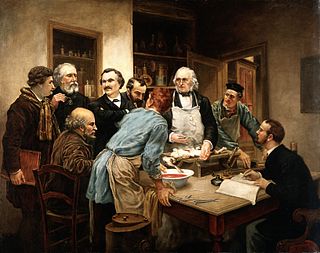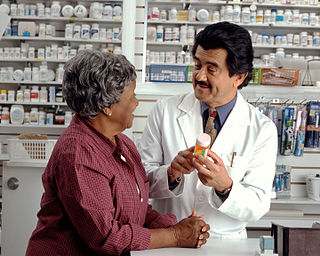Professional Further Education in Clinical Pharmacy and Public Health (Danish : Faglig videreuddannelse i Klinisk farmaci og Folkesundhed) is a Danish professional postgraduate higher further education for Danish pharmaconomists (experts in pharmaceuticals).

Danish is a North Germanic language spoken by around six million people, principally in Denmark and in the region of Southern Schleswig in northern Germany, where it has minority language status. Also, minor Danish-speaking communities are found in Norway, Sweden, Spain, the United States, Canada, Brazil, and Argentina. Due to immigration and language shift in urban areas, around 15–20% of the population of Greenland speak Danish as their first language.

Denmark, officially the Kingdom of Denmark, is a Nordic country and the southernmost of the Scandinavian nations. Denmark lies southwest of Sweden and south of Norway, and is bordered to the south by Germany. The Kingdom of Denmark also comprises two autonomous constituent countries in the North Atlantic Ocean: the Faroe Islands and Greenland. Denmark proper consists of a peninsula, Jutland, and an archipelago of 443 named islands, with the largest being Zealand, Funen and the North Jutlandic Island. The islands are characterised by flat, arable land and sandy coasts, low elevation and a temperate climate. Denmark has a total area of 42,924 km2 (16,573 sq mi), land area of 42,394 km2 (16,368 sq mi), and the total area including Greenland and the Faroe Islands is 2,210,579 km2 (853,509 sq mi), and a population of 5.8 million.
Postgraduate education, or graduate education in North America, involves learning and studying for academic or professional degrees, academic or professional certificates, academic or professional diplomas, or other qualifications for which a first or bachelor's degree generally is required, and it is normally considered to be part of higher education. In North America, this level is typically referred to as graduate school.
The education programme is developed by Pharmakon—Danish College of Pharmacy Practice, the Danish Association of Pharmaconomists and the Danish Pharmaceutical Association. The further education takes place at Pharmakon—Danish College of Pharmacy Practice in Hillerød, Denmark.
Pharmakon—Danish College of Pharmacy Practice is a university college situated in the city of Hillerød on the island of Zealand in Denmark.
The Danish Association of Pharmaconomists is the trade union that represents pharmaconomists and pharmaconomist students in Denmark.

Hillerød is a Danish town with a population of 32,689 (2018) located in the centre of North Zealand approximately 30 km to the north of Copenhagen, Denmark. Hillerød is the administrative centre of Hillerød Municipality and also the administrative seat of Region Hovedstaden, one of the five regions in Denmark. It is most known for its large Renaissance castle, Frederiksborg Castle, now home to the Museum of National History. Hillerød station is the terminus of one of the radials of the S-train network as well as several local railway lines. The town is surrounded by the former royal forests of Gribskov to the north and Store Dyrehave to the south.
The admission requirement is a Danish pharmaconomist degree diploma granted by Pharmakon—Danish College of Pharmacy Practice. The education corresponds to 30 ECTS credits that are equivalent to ½ year of full time study for a Clinical Pharmacy and Public Health Student. The education programme can be taken as a part time further education over 2-4 years. Nevertheless, the education must be completed within 6 years.
In product development and process optimization, a requirement is a singular documented physical or functional need that a particular design, product or process aims to satisfy. It is commonly used in a formal sense in engineering design, including for example in systems engineering, software engineering, or enterprise engineering. It is a broad concept that could speak to any necessary function, attribute, capability, characteristic, or quality of a system for it to have value and utility to a customer, organization, internal user, or other stakeholder. Requirements can come with different levels of specificity; for example, a requirement specification or requirement "spec" refers to an explicit, highly objective/clear requirement to be satisfied by a material, design, product, or service.
In Denmark, pharmaconomists are experts in pharmaceuticals who have trained with a 3-year tertiary degree. Pharmaconomy describes either their professional practice or their training courses.
An academic degree is a qualification awarded to students upon successful completion of a course of study in higher education, usually at a college or university. These institutions commonly offer degrees at various levels, usually including bachelor's, master’s and doctorates, often alongside other academic certificates and professional degrees. The most common undergraduate degree is the bachelor's degree, although in some countries lower qualifications are titled degrees while in others a higher-level first degree is more usual.
The purpose of the Professional Further Education in Clinical Pharmacy and Public Health is to qualify each pharmaconomist (expert in pharmaceuticals) to practice clinical pharmacy at a higher and more professional level. The education consists of five modules:
Professional certification, trade certification, or professional designation, often called simply certification or qualification, is a designation earned by a person to assure qualification to perform a job or task. Not all certifications that use post-nominal letters are an acknowledgement of educational achievement, or an agency appointed to safeguard the public interest.
- Module 1: Anatomy, physiology and biochemistry — 4 ECTS credits
- Module 2: Pathology and microbiology — 4 ECTS credits
- Module 3: Pharmacology — 4 ECTS credits
- Module 4: Public health and Communication Studies — 9 ECTS credits
- Module 5: Clinical pharmacy and pharmacotherapy — 9 ECTS credits

Anatomy is the branch of biology concerned with the study of the structure of organisms and their parts. Anatomy is a branch of natural science which deals with the structural organization of living things. It is an old science, having its beginnings in prehistoric times. Anatomy is inherently tied to developmental biology, embryology, comparative anatomy, evolutionary biology, and phylogeny, as these are the processes by which anatomy is generated over immediate (embryology) and long (evolution) timescales. Anatomy and physiology, which study (respectively) the structure and function of organisms and their parts, make a natural pair of related disciplines, and they are often studied together. Human anatomy is one of the essential basic sciences that are applied in medicine.

Physiology is the scientific study of the functions and mechanisms which work within a living system.

Biochemistry, sometimes called biological chemistry, is the study of chemical processes within and relating to living organisms. Biochemical processes give rise to the complexity of life.
The total fee for the entire education programme amounts to 170,000 DKK (31,000 USD or 18,200 GBP).
A fee is the price one pays as remuneration for rights or services. Fees usually allow for overhead, wages, costs, and markup.

The krone is the official currency of Denmark, Greenland, and the Faroe Islands, introduced on 1 January 1875. Both the ISO code "DKK" and currency sign "kr." are in common use; the former precedes the value, the latter in some contexts follows it. The currency is sometimes referred to as the Danish crown in English, since krone literally means crown. Historically, krone coins have been minted in Denmark since the 17th century.

The United States dollar is the official currency of the United States and its territories per the United States Constitution since 1792. In practice, the dollar is divided into 100 smaller cent (¢) units, but is occasionally divided into 1000 mills (₥) for accounting. The circulating paper money consists of Federal Reserve Notes that are denominated in United States dollars.






